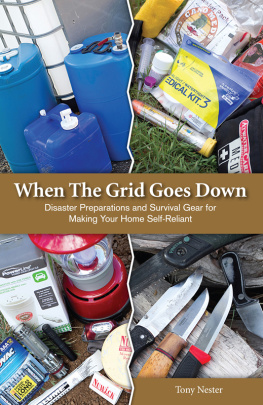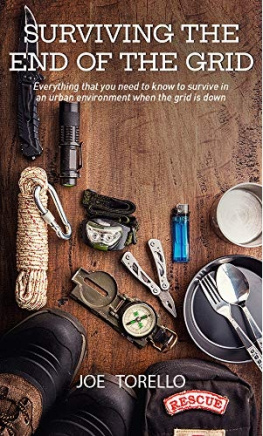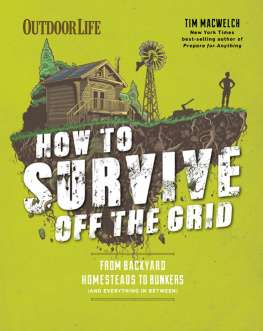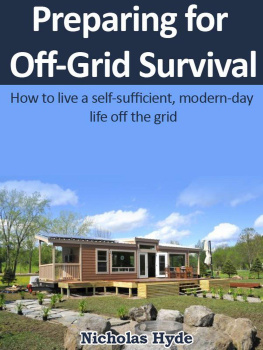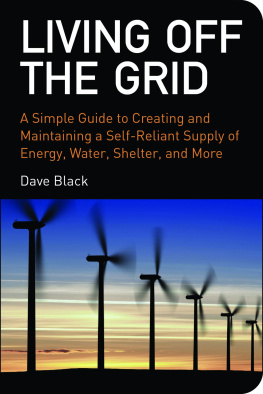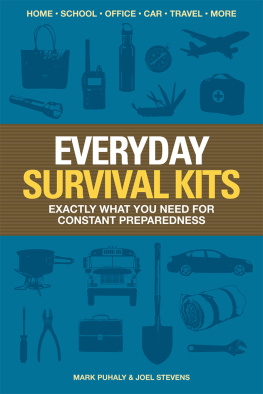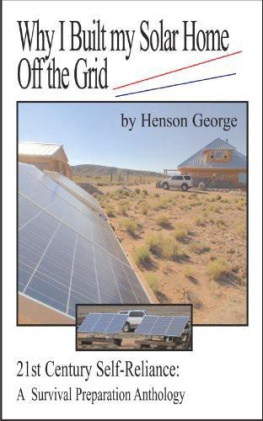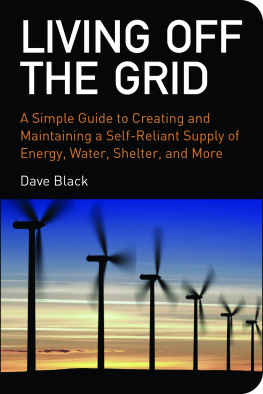

When the Grid Goes Down
Disaster Preparations and Survival Gear For Making Your Home Self-Reliant
By Tony Nester
Copyright April 2012 by Tony Nester
Published by Diamond Creek Press
PO Box 2068
Flagstaff, AZ 86003
1-928-526-2552
www.diamondcreekpress.com
Email:
Cover photo by Michael Bielicki
ISBN 978-0-9713811-4-8
eISBN: 9781624888472
Printed in the United States of America. Dealer inquiries to the above address.
All rights reserved. No part of this book may be reproduced or used in any manner without written consent except for use in reviews.
Also by Tony Nester:
Practical Survival Tips, Tricks, & Skills
Desert Survival Tips, Tricks, & Skills
The Modern Hunter-Gatherer: A Practical Guide to Living Off the Land
Desert Survival DVD
Tony Nester's Practical Urban Survival DVD Series, Volumes 1 & 2
Disclaimer
The information provided in this book is for academic purposes only. The author made every effort to ensure the information was correct at the time of publication and the author, Diamond Creek Press and Ancient Pathways, LLC assume no liability for any laws broken by the reader nor any personal injury or injury to anyone else for the use or misuse of the information contained in this book.
Visit us at www.apathways.com for information on our other books or survival training courses.
Once again, thanks to friend Randy Miller who has lived and breathed self-reliance before the concept was mainstream and who has always graciously shared his wealth of insights and experience with the lifestyle. To my good friend and fellow survival instructor Mike Masek who has been there through thick and thin and always lends invaluable lessons from his globetrotting days in remote regions. I also want to acknowledge Jerry Ward of Ozark Mountain Preparedness with whom I've enjoyed many fine conversations in both the urban and wilderness worlds. Thanks to WEMT instructor and guide extraordinaire, Bill Downey who has lent his considerable remote medicine experiences to my knowledge of disaster first-aid and backcountry medical skills. Thanks to Gabe Suarez and Tom Sotis, two legendary pioneers in the field of combatives who have been instrumental in shaping my thinking on personal defense. Lastly, to the many first-responders and real-world survivors who have shared their stories and insights into what it takes to prevail and how community effort reigns supreme when the chips are down.
I make my living as a fulltime survival instructor and have been teaching courses in bushcraft and survival since 1989. Over the years, students of mine have often asked "What's the difference between urban and wilderness survival?" Not much is my response. Your body doesn't care when you have hypothermia, broken ribs, or dehydration if it's in the wilds or downtown Seattle. We humans have certain physical priorities that must be taken care of or we will die.
The methods for meeting your priorities are different but the priorities themselves remain the same regardless of environment. The methods for surviving in the backcountry will entail treating medical injuries, building a shelter for warmth, staying hydrated by locating a water source, and communicating with searchers. In an urban disaster, you will also be tending to medical issues, staying warm and dry (shelter), tapping your water reserves and trying to communicate with family. There's quite a bit of overlap.
One difference between the city and the wilderness is in the area of self-protection. I don't encounter many roving bands of hungry bandits on my dayhikes in the mountains. I am very likely to in a depressed urban catastrophe where stores lay bare for weeks. Desperation can happen after day three in a large city when the grocery shelves empty and the water tap is dry. By day five, anarchy and roaming groups of hungry souls will be looking for those who can provide, peacefully or otherwise. This is another reason to keep your preps low-profile.
In addition to my work in the survival field and the lifestyle of self-reliance my family and I have worked towards, I've also interviewed survivors in natural disasters like the Indonesian tsunami, first responders in Katrina and soldiers deployed to war-torn regions where catastrophes seem to be a daily way of life. All have mentioned the same thing: food, water, and personal safety are what life boils down to in an urban disaster. Little else matters when life is driven into a corner.
When not out in the field or on the road teaching, I live in a passive-solar, strawbale house in the mountains with my family. We garden, forage, hunt and have incorporated many of the strategies in this book into our daily lives but it didn't happen overnight. Self-reliance is something that you ease into working at each piece of the puzzle until, one day, the pieces fit together a little smoother and you become less dependent on the tether back to the city. It's something we still build upon each year. Throughout these pages, I will be drawing upon the methods we have used to build a more personally sustainable lifestyle.
For years, my company also ran a 9-week program called the Southwest Semester Program in traditional skills and bushcraft in northern Arizona. My students and I came to live primitively, in the backcountry for over two months and learned to wrest a living from the wilds using the old skills. While part of this time was spent on numerous walkabouts in the desert and fieldtrips to tribal lands, we all lived off-grid at our basecamp learning the age-old skills of self-reliance. Our basecamp is spread over 40 acres of high-desert that backs up to miles of rugged wilderness. In this remote setting, we lived, worked, ate, slept, and took care of life's most basic necessities while learning to make do with less dependence on the modern system.
Taking care of a small tribe of individuals for over two months provided great insight into needs vs. wants in a setting that was light on modern conveniences. How much food, water requirements and storage, firewood quantities, shelter material, hand-tool types and maintenance, cooking gear, laundry materials, repair items, clothing and laundry issues, pest-control (most were eaten!), sanitation and medical gear to name a few items, were all worked out via trial and error and further refined with each program. The weather, from torrential rain and snow to triple-digit heat was also an excellent teacher that operated on a pass/fail system and provided instant feedback.
There is certainly a long list of skills and topics that you can tackle when delving into a self-reliant home. A survival gear industry has sprung up in response to this and unfortunately fosters a doom & gloom mentality to peddle their goods. You will see that time and again, that low-tech methods and gear are often the best ones to have in place. To the person just getting started the gear lists and survival methods can be overwhelming and I have kept to just the six core areas for preparing. Obviously you can expand on this by getting into solar energy, wind turbines, livestock and poultry, gardening and so on but, as with my other books, this one sticks to the basics and is designed to provide the foundation skills and tips.
Think of a long-term grid-down situation as basically camping out in your home because that is what you will be doing. Sleeping under a pile of blankets, dressing in layers- heating the body not the house, cooking on propane or a campfire, gathering intel from the radio (and possibly internet?), reading by candlelight or headlamp, skipping the daily shower in favor of a bi-weekly sponge bath, collecting rainwater and being your own first-responder- this will be the new norm if a disaster cripples your region.
Next page
